Who was Bert Temple ?
Bert
Temple was quite a private, unassuming man, unaccustomed to being in the public
eye - preferring not to be, retaining some anonymity, but the success of his
brainchild – the A.O.F.B. – put paid to that. Bert, by all accounts, was very
quick witted with a great and dry sense of humour, being a bit of a elaborate practical
joke to boot . The following is the
result of several years of research – substantiated and supplemented by
surviving family members – my thanks to Richard and the rest of the Temple
Family .
Bert's early years.
Herbert Temple was born on 5th August
1879 to proud parents Alfred Longdale and Mary Jane (nee Smith),
Alfred hailing from St Bees, Whitehaven in Cumberland
and Mary from Rippon in Yorkshire.
Bert was born at the then, family home at 2 Chaucer
Road, Brixton, Herne Hill, London,
just off the Dulwich Road
opposite Brockwell Park.
Bert had several brothers and a sister; George born June 1878, Ernest born
September 1880, Alfred - September 1882, Sydney
born between January and March 1884 and Marion
born between July and September 1893.
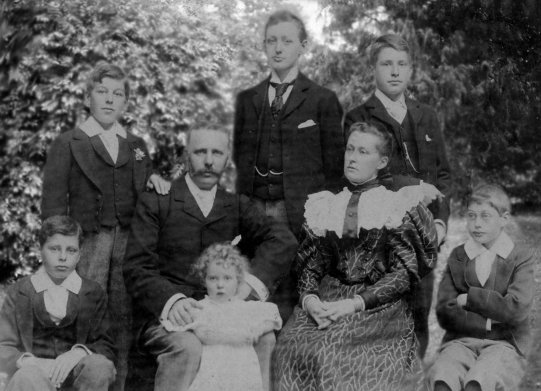
The Temple family circa
1895 - Bert is far right on the back row
Picture supplied and Copyright the Temple Family
Bert’s father, Alfred Longdale Temple, was raised
as a child in his birthplace of St Bees, Whitehaven. He was believed to have
worked in a Manchester lace making mill before he moved to London, sometime between 1871-1881. Alfred was a resident as well as an employee, of
4 - 6 Cannon Street, the premises of lace manufacturers, Higgins, Eagle and Co.
Alfred originally started out as a
warehouseman, moving up to a lace buyer and was residing in Chaucer Road. Alfred rose through the company to eventually become a
Managing Director and Chairman of Higgins, Eagle and Co. Alfred held strong
Christian values and had a good Victorian head for business, although a self
made man, was all too aware of how fortunate the family were to be so
comfortable.
The boys were schooled locally at Alleyn's school, Dulwich, but were removed
to further their education at Dulwich
College ( after a sporting accident
that blinded Bert’s brother Sydney ). The
family moved several times over the following years to various residences
including York Villa, East Dulwich, Suffolk Villas, Norwood
, Barham House, Streatham and Glenholme, Streatham, London.
Alfred was generous to those around him, providing for Sydney
as well as granting dowry’s to the family upon reaching 21 telling them to go
and do something worthwhile. At age 21, residing at Glenholme, Bert became a
silk agent, quite possibly using the dowry to set himself up in business.
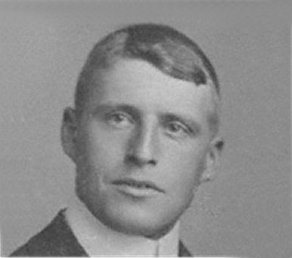
Bert Temple circa 1900
Picture supplied and copyright the Temple Family
Bert and the Military.
Bert enlisted in the Artists Rifles (Middlesex) as a volunteer on 15th November 1898 , Reg No. 5421,
The majority of the permanent regiments were away fighting the Boer War. The
Artists rifles went on to merge into the 28th ( County
of London ) Battalion London
Regiment, and Bert was discharged 9th
March 1904.
The Artist Rifles being a Special Services Unit and
now regarded as one of the forerunners to modern Special Services Units
including the Special Air Service ( not formed until during World War II ).
Bert later enlisted as a volunteer in the King Edwards Horse, 23rd Oct 1904, Reg No. 37. The
regiment was only formed in 1901 as the 4th County
of London Imperial Yeomanry (King's
Colonials) with its HQ at Charing Cross, London.
Bert became quite an accomplished horseman and was also quite an accomplished
Polo player. He was discharged from the King Edwards Horse on 22nd Oct 1911 at his own
request.
Little is then known until Bert enlists in 23rd Service, City of London
Regiment of the Royal Fusiliers - 1st Sportsman's
Battalion, Reg No 903 on 20th October
1914, to do his bit in the Great War ( First World War ).
It is possible that he was travelling the silk route. An
account by Bert , which appears in the A.O.F.B. annual, states he first heard
the A.O.F.B. anthem aboard a pearling schooner on Christmas day 1913 in the
South Sea islands. Entirely possible and plausible but unsubstantiated, and
could be fanciful. Bert does say that the original lyrics were ‘slightly
inappropriate to our delicate ears’, yet quotes some of the lyrics – which were
written by the song writing team of James Campbell and
Reginald Connelly under the pseudonym of Irving King some years later.
The 23rd Battalion was formed primarily from sportsmen and middle
to high class gentlemen, at the Hotel Cecil in the Strand,
London, 25 Sept 1914, by E. Cunliffe-Owen. The regiment
also took on slightly older enlistees than normal, the thought being that many
sportsmen had higher than normal fitness levels which would reduce the training
and battle readiness should they be required.
From his Military medical records of 1915 we know Bert to be around 5 foot 8
inches tall , with a 39 inch Chest weighing 163 pounds ( 11 stone 9lb ) with
brown eyes and dark brown hair .
On 26 June 1915 the
regiment was transferred to Clipstone Camp, Nottinghamshire and attached to
99th Brigade, 33rd Division. The regiment then transferred to the Kandahar
Barracks at Tidworth around the time that Bert became an unpaid Lance Corporal
on 8th August 1915. The unit
was sent to Boulogne, France
on 17th November 1915
joining with the 99th Brigade to 2nd Division on 25th November 1915 to fight on the Western front. In the
trenches Bert became friends with cricketer Andrew Sandham; an article appeared
in the Sporting Times some years later requesting that Froth Blowers attend a
benefit cricket match for Andrew.
“ Blower Andrew Sandham (Surrey XI) is having a benefit at the Oval 20th August 1927, Surrey vs. Yorkshire. Andy being one of the earliest members of
Ye A.O.F.B., it is particularly requested by No.0 that all cricketing members
of the fraternity will assemble to do their bit for Andy. Private A Sandham and
Lance Corporal Bert Temple shared blankets, bully beef, baccy and beer together
in the 1st Sportsman's Battalion somewhere in France . Don't forget Andy's Oval
Financial benefit.”
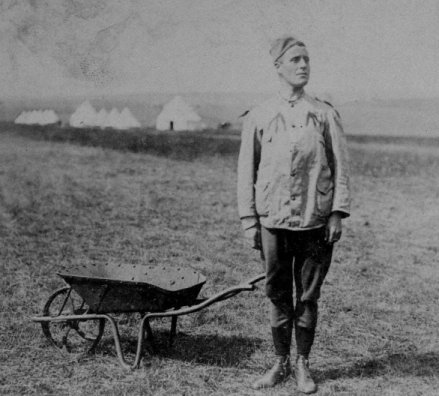
Bert in ‘posed for as a P.O.W.’ picture
1915 somewhere on the Western Front
Picture supplied and Copyright the Temple
family
Bert was substantatively promoted to Lance Corporal 3rd March 1916, which
incidentally was the day he was admitted to the Royal Hospital, Chelsea, London
with an injury, which is not thought to be a war wound, the injury being
muscular related - possibly hernial . Bert was treated and discharged from
hospital 31st March 1916.
He then enlisted into the Royal Army Service Corps ( Labour Corps) Reg No.
301410 at Woolwich. He was deemed as enlisted on 2nd March 1916, prior to his hospital admission and
promotion, and Bert "reverted" to Private on joining the Service
Corps. Interestingly his official discharge from 'the Sportsman's' as "no
longer physically fit for war service" was not until 17th April 1916. The official recorded cause was nystagmus in
both eyes ( involuntary eye movement and night blindness ). It had long been a
family belief that Bert fell victim to a gas attack whilst in the trenches, it
is possible that the nystagmus was a side effect. Bert’s health certainly
started to deteriorate upon his return from Belgium and Northern France although this
could have been the onset of the tuberculosis that eventually claimed him – the
trenches were a perfect catalyst for the spread of tuberculosis – itself
possibly being expedited by gas warfare.
Bert was then transferred to Grove
Park 17th March 1917 into the R.A.S.C. M.T. (Motor Transport)
where he passed his "learners" test and was appointed Lance Corporal 24th July 1917, specialising as a
dispatch rider. He was later demoted to Private on 2nd December 1917 after
failing his "trades test", then later reclassified as "passed test"
on 1st July 1918 as Lorry 2 (Hallford) driver as an acting Lance Corporal. He
was then appointed L/Cpl on 17th Nov
1918, progressing to Sargeant by 28th Oct 1918. Bert was demobbed 11th March 1919 bringing his military service,
much as a volunteer, to an end.
A.O.F.B. Conception.
Bert returned to the trade he knew as a silk agent, merchant and manufacturing
agent. Bert's 'home' addresses in the early days of his return to 'civvy
street' are at the Hascells Hotel, the Strand and the
Playgoers Club, Cranbourne Street.
It certainly looks like he led a bit of a playboy life style; some reports of
the A.O.F.B. creation mention Bert having 'a face lined by the ravages of the
Great War combined with an excess of Bacchus and a neglect of
Morpheus'. In 1921 he joined Richard K Fowler in a partnership based at 145 Cheapside
as Fowler and Temple, manufacturing
agents. Richard had already been established at 145 Cheapside
for nearly 2 years. The premises at 145 Cheapside were a
multi-occupancy address; there were many 'rag trade' businesses operating from
there. In 1922 occupants included Cooper Craigs Limited, mercantile agents;
A.C. Patrick and Co. silk merchants; The Wholesale Fur co.; Martin &
Savage Limited, bulk textile merchants; W.G. Cross & Beard, neckwear
novelties; H. Rogers & Co., silk agents; Albert Theobald Bishop,
manufacturers agent; Harry Green Valentine, silk agent; Harry Saunders, costume
maker; George Allen & Co., silk agents; Albert Edward Galloway,
manufacturers agent as well as our boys Fowler and Temple. Where Bert was
between 1919 and 1921 is unknown, he may have been here as an employee or off travelling
the silk route again.
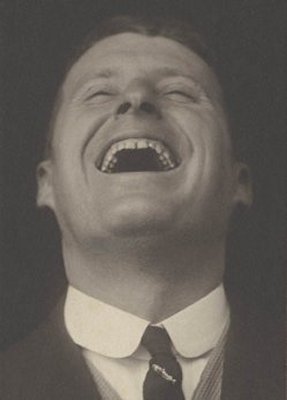
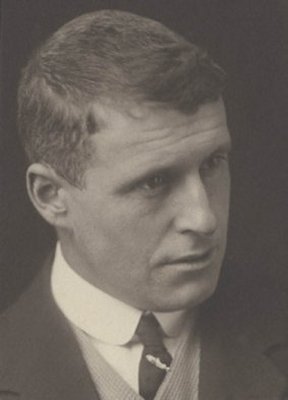
Bert Temple circa 1920
Pictures supplied and Copyright the Temple
Family
In the autumn of 1924 Bert was operated on by eminent surgeon Sir Alfred
Downing Fripp. Sir Alfred performed a life saving stomach operation (what for,
is unknown at present ) and whilst Bert was recovering from the op he requested
an ale, a slightly unusual request but one which was granted and Alfred Fripp
watched as Bert drank with 'apparent gusto'. Sir Alfred was not adverse to the
apocryphal (or not) medicinal properties, if not a general panacea, and the
affect it may have upon a patient.
Later during a post operative consultation in Sir Alfred's consulting room in
his home at Portland Place
in November 1924 Sir Alfred Fripp referred to Bert as 'a bad lad who has taken
the best out of life and put nothing back'. The conversation then turned to one
of Sir Alfred's worthy causes , the Invalid Children's Aid Association, Bert
eager to show gratitude for having his life saved (and possibly by being shamed
by Sir Alfred's comments) offered to raise the sum of £100 for Sir Alfred's
charities and the following day A.O.F.B. was founded. Sir Alfred Fripp becoming
Froth Blower No.1 with Bert as Honorary Secretary, Frothblower No. 0 of the
A.O.F.B..
Nearing the end.
Bert's health was reported to not have been good from around 1926 onwards, Bert
himself on page 7 in the membership handbook stating 'Your Hon. Sec No.0 nearly
dead.' under the heading of A.O.F.B.'s London Calling, the same lines also
appearing on the Ashtead Potters order forms for their tankards. Bert's love of
beer and tobacco probably contributing, or it could have an escalation of the
tuberculosis which took Bert eventually. Sir Alfred was known to hope that the
future would find a way to stamp out the 'white plague of the tubercle
scourge.' Was it tuberculosis that bought the two men together back in 1924 ?
Bert continued to promote the A.O.F.B. with fellow 'officers' Sir Alfred Fripp,
David Henry Cain (Sporting Times), John Andrew 'Jack' Haes ( London Stock
Exchange) by attending as many functions and gatherings as he could although in
February 1928 Bert's health had deteriorated further and Sir Alfred ordered
Bert to refrain from attending Vat meetings and functions for a 'considerable
time'. Bert did attend the odd function in a limited capacity until June 1928
and was then known to have been recuperating somewhere in Devon
and 'lubricating in moderation' during July 1928.
Bert was living at flat 3, 373 Richmond Bridge Road,
Richmond Bridge, Surrey
when his health deteriorated further and he went into a nursing home at 22a Devonshire
Street , Marylebone, London.
Bert finally passing away there on 18th
February 1931 as a result of respiratory failure bought on by
pulmonary tuberculosis. The death was certified by Alfred Thomas Fripp, Sir
Alfred's son, who had followed in his fathers’ footsteps into the medical
profession.
A death notice in the newspapers reporting ; "Funeral service at St
Marylebone Church, York Gate, N.W.1, Monday, Feb 23, at 12 noon, followed by
private cremation at Golder’s Green. No flowers. (Colonial papers please
copy)."
An obituary from the Times Newspaper February 25th, 1931 reads :
"The announcement in your columns last week of the death, after a short
illness, of Mr. Herbert Temple prompts me to pay a tribute to his untiring and
devoted work as the originator and founder of the Ancient Order of Froth
Blowers, which has been the means of raising over £100,000 for children’s
charities. It was characteristic of “Bert”
Temple’s generous mind that he conceived the idea
of the A.O.F.B. as a means of ex-pressing his appreciation to the late Sir
Alfred Fripp who had helped him to regain his health. Knowing Sir Alfred’s
interest in children, Temple
started in 1924 what was originally intended to be only a small and private
organisation. Gradually however, the Order grew until the membership totalled
over 678,000, and included men and women in every walk of life, and scattered
all over the Empire. As a result of his work 50 cots have been endowed in
various hospitals; £12,000 has been devoted, through the Invalid Children’s Aid
Association, to the equipment of a home at West Wickham for children suffering
from rheumatic fever; and £14,000 for founding a trust in connexion with the
Boy Scout and Girl Guide movement for helping to send poorer children to camp. Temple’s
death at the age of 51 is an irreparable loss to the order; but he leaves
behind him, not only the recollection of a genial and jovial personality, but a
lasting memorial in the many children’s charities which have benefited by his
untiring efforts. By Our Own Correspondent.
"
Bert wrote his Last Will and Testament on 12th July 1929 in the A.O.F.B. offices at 145 Cheapside,
the will witnessed by other workers there; Una Agnes Chick and Mabel Caroline
Yeomans. The will revealed that Dorothy Roper, the A.O.F.B. secretary, was
Residuary Legatee and sole beneficiary as bequeathed. Dorothy was left £1217 8
/- 2d ( £1358 1s 1d cash, gross ) and all possessions including jewellery
(sic), furniture, insurance monies and all monies due to me from various
sources.' The total value of the estate Bert left is unknown.
The will further revealed that Dorothy was actually married and was Dorothy
Lillian Sheppard although she still used the name Roper, possibly as it was so
well known amongst Froth Blowers.
Dorothy, the Gentle Zephyr as Bert named her, was born in 1902 in Greenwich,
London, and married ironmonger
Richard Howard William Sheppard ( also born in 1902 Greenwich,
London ) on 18th July 1926. Dorothy was believed to be a
loyal employee of Fowler and Temple
and worked with and alongside Bert prior to the inception of the A.O.F.B. and
continued to do so when it took off, attending some of the A.O.F.B. functions
at his side. Her loyalty to Bert was plain to see, with Bert possibly repaying
her loyalty with his legacy.
Dorothy regularly placed In Memoriam messages for Bert on the anniversary of
his passing in the Times Newspaper , still under her maiden name of Roper, the
last one placed being in 1978, presumably Dorothy passing away herself
afterwards .
Bert was survived both parents, Alfred Longdale passing 23rd April 1938 aged 87
and mother Mary Jane passing 15th October 1947 aged 94. After Alfred Snr passed
away, Mary, moved to Grove Hall on the outskirts of Tywford, near Reading.
Son, Ernest moved with her moving into a cottage in it's grounds and named it
the Wee Waif' Cottage. Ernest bought an existing nearby grocery store and
teashop, originally called Kismet, and expanded it into the Wee Waif'
Roadhouse, consisting of a licensed restaurant a snack bar and petrol station
to cater for passing trade on a newly opened bypass. During the Second World
War the Wee Waif' Roadhouse was sold as a going concern with Ernest continuing
to live at the Wee Waif Cottage. Mary passed away at the nearby Hermitage in
1947 and Ernest continued to live in the cottage until his passing 1962. Grove
Hall and the Wee Waif' no longer exist but there is a Wee Waif Lodge Hotel
built on the site at Old Bath Road,
Charvil. The name lives on as well as the memory. Some of the history of
the A.O.F.B. can be seen on posters in the bar area of the Wee Waif Lodge.
The Friends of the Froth Blowers January 2009 with gratitude to the Temple Family.
Back
to Home
Back
to Regalia / Merchandise





